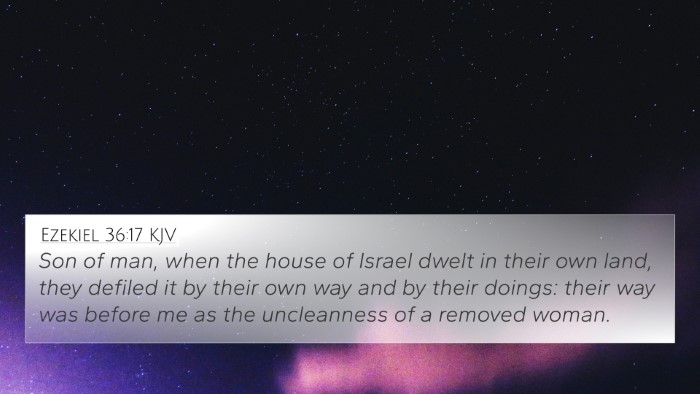Understanding Leviticus 18:28: Meaning and Insights
Leviticus 18:28 states, "That the land spue not you out also, when ye defile it, as it spued out the nations that were before you."
This verse serves as a crucial reminder of the serious consequences that follow moral and ethical failures. Throughout the Bible, the concept of defilement is intricately linked to the holiness of God and His promised land. The insights derived from public domain commentaries by Matthew Henry, Albert Barnes, and Adam Clarke provide a rich perspective on this verse.
Summary of Insights
The summary draws from various commentaries:
-
Matthew Henry: He emphasizes that the land is not simply a physical territory but is sacred in the sight of God. Henry warns that just as the land had expelled previous nations for their abominations, so too would it reject Israel if they were to adopt similar practices. This indicates a spiritual obligation to maintain purity.
-
Albert Barnes: Barnes highlights that God held nations accountable for their actions and that moral decay inevitably leads to divine judgment. He draws attention to the idea that the land bears witness against those who defile it, underscoring the covenant relationship between God and His people.
-
Adam Clarke: Clarke relates this verse to the broader biblical theme of divine retribution. He interprets "the land spue not you out" as a warning that habitual sin can lead to severe consequences, mirroring the fate of previous inhabitants. Clarke posits that God's laws are designed not just for the well-being of the community but also for the preservation of the land itself.
Cross-References for Leviticus 18:28
Understanding Leviticus 18:28 can be deepened through its connections to other scripture passages. Here are some notable cross-references:
- Numbers 35:33-34: Warns against defilement of the land through bloodshed and emphasizes God's presence in the land.
- Deuteronomy 9:4-5: Explains that Israel's conquest is due to the wickedness of the nations, not their own righteousness.
- 2 Chronicles 36:16: Relays the consequences that followed when the people ignored God's warnings, leading to exile.
- Ezekiel 36:17-19: Reflects on Israel's defilement and God's initiative to restore them for His name's sake.
- Jeremiah 2:7: Discusses how Israel became a land of defilement, and God’s displeasure over their actions.
- Matthew 5:13: Jesus calls believers the salt of the earth; similar to preserving qualities of purity in the face of moral decay.
- Romans 1:18-32: Paul speaks of God's wrath against ungodliness and the consequences of turning away from divine truth.
Thematic Connections and Analysis
Leviticus 18:28 is steeped in themes of holiness, divine justice, and the covenantal relationship between God and His people.
Connections between Bible verses: The verse acts as a pivotal point that links the Old Testament laws with the New Testament teachings. Themes of purification and accountability echo through various scriptures, reinforcing the understanding that God's character remains consistent throughout the biblical narrative.
Tools for Bible Cross-Referencing
Engaging in a cross-referencing Bible study is an enriching way to explore the depths of biblical texts. Some tools for Bible cross-referencing and methods include:
- Bible concordance: A valuable resource for locating terms and their occurrences across the text.
- Bible cross-reference guide: Organizes passages to show thematic and contextual links.
- Bible chain references: Follow themes across verses, creating a narrative chain related to specific teachings.
Conclusion
In conclusion, Leviticus 18:28 serves as a sobering reminder about the consequences of abandoning God's moral standards. The insights gathered from renowned Bible commentaries shed light on the significance of maintaining spiritual integrity. Furthermore, employing cross-referencing methodologies allows readers to discover a rich tapestry of interconnected biblical truths.
A thorough understanding of this verse not only aligns with the holistic vision of God’s kingdom but also speaks to contemporary issues of moral decay, emphasizing the eternal relevance of scripture in our lives.









